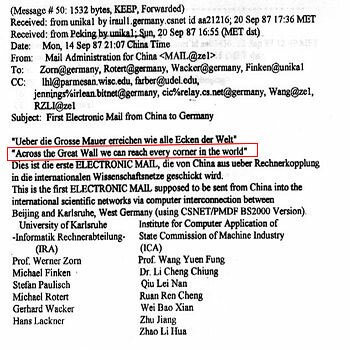Michael Turton responds forcefully to a post by Madman of Chu (MoC) last week arguing that closer economic integration across the Taiwan Strait would lead to the Taiwanization of China.:
 … One could profitably ask — what integration? May as well say that a mining company is integrated with its vein of ore. Taiwanese investment in China is a plant that exists in the hothouse of 9% growth. If that growth should slacken, the plant will die. Although I have been talking to local businessmen about Taiwan-China investments for many years, I have never heard one say: "I really have come to love China and even if the economy tanks and my costs rise, I’ll still keep my company there regardless." Taiwanese economic investment in China has not produced any emotional connection to China. In fact, until the economy took off at the turn of the century, polls showed consistently that Taiwanese who went to China came back more confirmed in their Taiwanese identity. Talk of political integration following trade is strictly a phenomenon of the last five years, and, I believe, strictly a wish-fantasy of those who flinch from facing the reality of potential conflict in the Taiwan Straits.
… One could profitably ask — what integration? May as well say that a mining company is integrated with its vein of ore. Taiwanese investment in China is a plant that exists in the hothouse of 9% growth. If that growth should slacken, the plant will die. Although I have been talking to local businessmen about Taiwan-China investments for many years, I have never heard one say: "I really have come to love China and even if the economy tanks and my costs rise, I’ll still keep my company there regardless." Taiwanese economic investment in China has not produced any emotional connection to China. In fact, until the economy took off at the turn of the century, polls showed consistently that Taiwanese who went to China came back more confirmed in their Taiwanese identity. Talk of political integration following trade is strictly a phenomenon of the last five years, and, I believe, strictly a wish-fantasy of those who flinch from facing the reality of potential conflict in the Taiwan Straits.
Another way to look at Taiwanese economic integration is to ask in what important way Taiwanese factories in China are different from the factories of other nations’ businesses in China. After all, American businessmen come to China, live in enclaves, shop in American supermarkets, eat in American-style restaurants, and take a local mistress. Ditto for Japanese businessmen. Again, do Taiwanese business behave differently? If economic integration drives political integration, surely China and Japan or China and America will draw closer politically. But the reality is that just the opposite has happened: Taiwan, Japan and the US have grown more wary of China even as their economic relationships with China have deepened.
AsiaPundit sees neither a political union between the Mainland and Taiwan nor a war as imminent. While I admit that both are possible, the former is far more unlikely. A war could be prompted by a single event such as a declaration of independence while unification would require a large series of events.
What I read in the MoC’s item on Taiwanization was not an argument for reunification but rather an expectation of political liberalization similar to what has happened in Taiwan, South Korea and elsewhere. That does come with wealth and exposure to outside liberal ideals - even Singapore and Hong Kong are relatively free, albeit not fully democratic.
Barring unforeseen events, the status quo is unlikely to change anytime soon.
Still, MoC’s flight of fancy is nice to entertain.:
"Strange as it seems to contemplate, coming decades could potentially see a KMT or DPP president at the helm in Beijing.:
Technorati Tags: asia, china, east asia, northeast asia, taiwan
Makeup should be applied in consideration of the tasks for the day, the magazine said, being light enough to look natural when women go out in the day and only more colorful if they perform on stage or “dance in the open air” at night.
 … One could profitably ask — what integration? May as well say that a mining company is integrated with its vein of ore. Taiwanese investment in China is a plant that exists in the hothouse of 9% growth. If that growth should slacken, the plant will die. Although I have been talking to local businessmen about Taiwan-China investments for many years, I have never heard one say: "I really have come to love China and even if the economy tanks and my costs rise, I’ll still keep my company there regardless." Taiwanese economic investment in China has not produced any emotional connection to China. In fact, until the economy took off at the turn of the century, polls showed consistently that Taiwanese who went to China came back more confirmed in their Taiwanese identity. Talk of political integration following trade is strictly a phenomenon of the last five years, and, I believe, strictly a wish-fantasy of those who flinch from facing the reality of potential conflict in the Taiwan Straits.
… One could profitably ask — what integration? May as well say that a mining company is integrated with its vein of ore. Taiwanese investment in China is a plant that exists in the hothouse of 9% growth. If that growth should slacken, the plant will die. Although I have been talking to local businessmen about Taiwan-China investments for many years, I have never heard one say: "I really have come to love China and even if the economy tanks and my costs rise, I’ll still keep my company there regardless." Taiwanese economic investment in China has not produced any emotional connection to China. In fact, until the economy took off at the turn of the century, polls showed consistently that Taiwanese who went to China came back more confirmed in their Taiwanese identity. Talk of political integration following trade is strictly a phenomenon of the last five years, and, I believe, strictly a wish-fantasy of those who flinch from facing the reality of potential conflict in the Taiwan Straits.


































